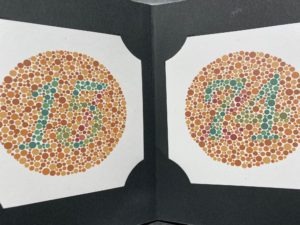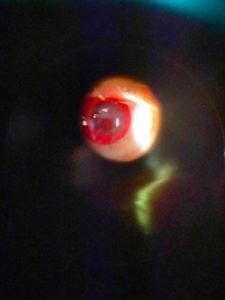X-Chrom Contact Lens for Color Vision Problems
- May 1, 2020 (Updated May 5, 2023)
Good color discrimination is required for pilots, electricians, law enforcement, and other occupations. Imagine if a police officer shot at the brown car instead of the green one. This would pose a safety and liability hazard. Therefore, some occupations have color vision requirements.
In some instances, children that aspire for one of these occupations find out late that they have a color deficiency. Disappointing, to say the least! This is one of the many reasons why children should undergo a comprehensive eye exam and not just a vision screening at school or at the pediatrician’s office. One trick to pass these occupational color vision requirements is wearing a red filter contact lens in one eye, usually the non-dominant eye. Wearing this type of contact lens creates an additional perceptual clue so you can see what is intended during color vision testing

Color Vision Plates

Color Vision Plates Through Red Filter
The old rigid X-Chrom lens
The X-Chrom contact lens (often misspelled as X-Chrome) gained interest in the late 1970s and 1980s. Only one custom contact lens lab now produces this proprietary, non-disposable contact lens in an antiquated and completely oxygen impermeable material called PMMA. This lens was evaluated for aeronautical uses and demonstrated to help with the common color vision plates, called pseudoisochromatic color tests. But there are drawbacks. It can reduce depth perception and does not improve the ability to pass some more esoteric color vision tests.
While the X-Chrom lens allowed wearers with color deficiencies to continue career aspirations with color vision requirements, this loophole was closed. Today, the Federal Aviation Administration (FAA) specifically disallows the use of color-altering contact lenses like X-Chrom for passing their flight physical. As another example, the California Department of Corrections and Rehabilitation disallows Peace Officers from using these color filter contact lenses to pass their color vision testing. Many other occupations likewise disallow use of X-Chrom and other color filters in order to protect public safety.
The new soft X-Chrom lens
A small number of eye care clinics prescribe the red-filter color soft X-Chrom contact lens, including ReVision Optometry. Fake X-Chrom contact lenses exist overseas, but they do not have FDA approval due to unknown safety and efficacy. Some patients complain that these fake lenses are uncomfortable and are afraid they will damage their eye. Wearers of genuine X-Chrom often find the lens helpful to enhance color discrimination. If you have a light eye color (blue or green), the red-color filter contact lens on one eye can look cosmetically disturbing. However, if you have a dark eye color, this cosmetic difference is not as apparent to people looking at you.
It is important to realize that the X-Chrom contact lens will not cure your underlying color deficiency. Nor will it allow you to see colors as a “normal” individual would. It just allows you to perceive colors differently. Whether this result is better or worse, is a matter of personal preference and interpretation.
How do I get a soft X-Chrom lens, and how much will it cost?
At your comprehensive exam at ReVision Optometry, you can learn your candidacy for the soft X-Chrom lens. If you are a good candidate, you’ll receive instructions on how to proceed forth, what to expect, and get your anticipated out-of-pocket cost. For most patients, the lens itself is less than $600. This excludes professional services including prescribing. Out-of-pocket cost depends on whether the lens is worn with eyeglasses, if you need astigmatism correction, your familiarity with contact lens application and removal, and if you are using any vision benefit plan. Our practice can assess these at your comprehensive exam.
Please reach out to our office about X-Chrom only if you have confirmed from your current or prospective employer that you are allowed to use a color filter lens in passing the common color vision test plates. Before scheduling for X-Chrom prescribing, you must provide us with a signed official letter from your employer representative which states that you are allowed to use a color filter to meet occupational vision requirements. ReVision Optometry will only prescribe X-Chrom for legitimate reasons in order to protect public safety.
As of May, 2023, please know that service levels by the outside laboratory that produces X-Chrom has declined. Turnaround time for X-Chrom lenses has approximately doubled, and some of our requests for production status have gone unreturned.
What’s the different between color blindness and color deficiency?
True color blindness, or achromatopsia, is exceedingly rare. Only about 1 in 30,000 have achromatopsia. Most that believe they are “color blind”, in fact have a color deficiency. Color deficiency is common, affecting about 1 in every 14 males. Genetic color deficiencies are linked to the X-chromosome. Color deficient individuals still have color perception. They will assign a name to each hue. But they will often name hues differently compared to someone with “normal” color vision. The X-Chrom contact lens is for those with color deficiencies.
How about EnChroma eyeglasses?
There are several viral, emotional videos showing the reaction of people putting on EnChroma eyeglasses. These color filter eyeglass lenses and target those with color vision issues. Several of the testimonials are moving. But do EnChroma eyeglasses actually work — or are they smoke and mirrors?
A 2018 study has debunked the efficacy of EnChroma lenses. Likewise, a 2020 study has shown that EnChroma lenses do not restore normal color vison. These lenses do not allow wearers to see new colors. They only allow wearers to perceive the same colors differently. An article in The Atlantic, and Gizmodo, each described underwhelming results. Nonetheless, there is a confounding amount pseudo-scientific information promoting these eyeglasses.
Is color deficiency a disability?
Color deficiency is not a disability under the Americans with Disabilities Act (ADA). Therefore, employers do not need to make reasonable accommodations for those with color deficiencies, unlike for other impairments.
